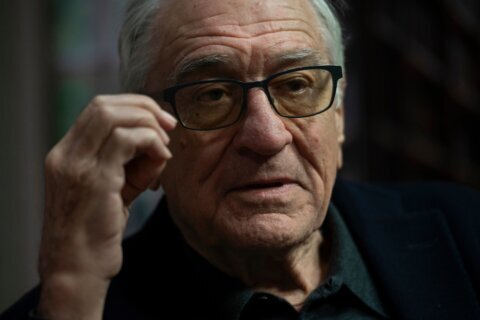WASHINGTON — You know him as Ebeneezer Scrooge in “A Christmas Carol” at Ford’s Theatre. You may also recognize him as the Republican Senate Whip in Season 2 of “House of Cards.”
Now, actor Edward Gero is playing an entirely different role as sitting Supreme Court Justice Antonin Scalia in the new play “The Originalist,” which runs at Arena Stage now through April 26.
“This is a meaty play — it does not tackle its subject matter lightly,” says director Molly Smith, who has also served as Arena Stage’s artistic director since 1998. “Happily though, [playwright] John Strand and his subjects have a gift for humor, so prepare to be both challenged and entertained by this piece of historical fiction.”
Strand wrote the play with Gero in mind, having worked with him a decade ago on “The Diaries” at Signature Theater. “The Originalist” follows a liberal law school graduate (Kerry Warren) who undergoes a clerkship with the 30-year conservative justice (Gero). Their opposing political persuasions make for passionate debates on hot-button issues: gun rights (Heller v. District of Columbia), abortion (Roe v. Wade) and the Defense of Marriage Act (Windsor v. United States).
“We’re taking a risk here and crossing a boundary,” Strand says. “We’re creating a play about a sitting Supreme Court justice. We start with a living public figure, identify him by name and craft a fictional drama around him. We use material from his life and work, from this city, from our time. But ‘The Originalist’ is not a bio play or a documentary or a law lecture. It is live theater. It has to engage, it has to invite you to feel and think, to laugh and shout and argue.”
Gero says it’s fascinating to watch the audience when he takes the stage for his opening monologue.
“When I walk out on stage, the opening scene is sort of a lecture, and you can feel the waves of tension from the people in the audience,” Gero says. “It’s like the State of the Union. You can tell what side of the aisle people are on. With Scalia, it’s like a Rorschach test. When I say I’m playing Scalia, I know immediately what side of the political spectrum people are on, the way they respond.”
Thus, Gero tries to sculpt a well-rounded character with definitive strengths and weaknesses.
“His strength is his fluency of the language and his knowledge of the issues and his ability to construct an argument thinking on his feet,” Gero says. “His flaws? Maybe he’s a little too sure of himself, maybe there’s a little bit of arrogance, people might say. It’s hard to say. I have to love the guy, and I do love the character, but he is arrogant. He is self-possessed, there’s no question about it.”
To prepare for the role, Gero read both Scalia’s biography “American Original” and the Federalist Papers. He also met with Justice Scalia for lunch.
“We didn’t talk about the play, we didn’t talk about politics, we just talked about things that are in common: Italian-American, Roman Catholic, New Jersey that we share,” Gero says. “We found out that our families are actually from similar areas in Italy, so it was a really good time.”
Perhaps most importantly, Gero visited the high court a handful of times to watch Scalia work.
“Getting to watch his behavior, getting to watch how the court works … to be in the courtroom, to get a real sense of the acute sense of listening that happens in the courtroom,” Gero says.
This sort of access makes Washington a unique location for theater. Los Angeles actors likely wouldn’t fly across the country to watch repeated Supreme Court arguments. Chicago actors couldn’t grab a routine lunch with Scalia. And Broadway actors can’t regularly perform with congressmen sitting in the audience, influencing their beliefs night in and night out.
“It puts the artist front and center in the conversation,” Gero says. “Washington is, in a way, the Athens of the modern world. It’s a place where artists can come and speak directly to the people who run our government. They’re our neighbors. They’re our audience members. We’re part of the same community. … It’s extremely important, I think, as artist-citizens to be able to talk about how we operate as a government.”
One of the most important lessons on “how we operate as a government” is the need for less vitriol in our politics. Gero says the play shows what is possible when political opponents listen to each other.
“You can have different points of view, different arguments, but it’s always argued with respect for the individual. No one’s being painted as a bad person,” Gero says. “So you have a very well thought out, well-reasoned debate or dialectic, which is something the play really deals with, that is to say, finding a way to talk to each other or argue, but listen at the same time. And that’s something we don’t do perhaps as much as we should in our political discourse these days.”
Click here for ticket information.
Hear the full interview below:







